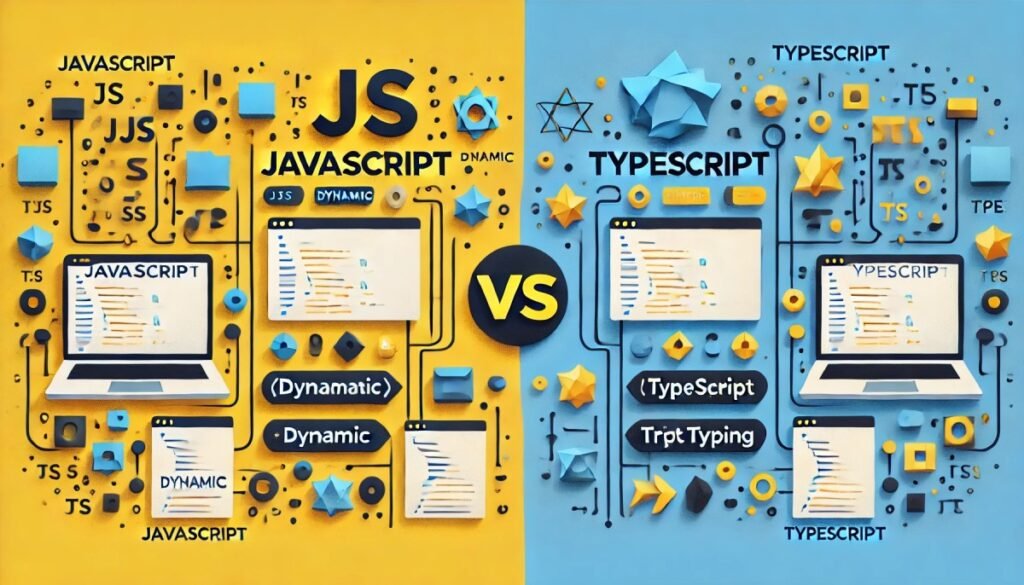TypeScript vs JavaScript: Is TypeScript Replacing JavaScript?

TypeScript vs JavaScript has become one of the most debated topics in modern web development. The discussion around TypeScript’s rise has sparked an ongoing debate: Is TypeScript taking over JavaScript? With its robust type system and enhanced tooling, TypeScript is becoming the default choice for many large-scale applications. However, JavaScript remains the foundation of the web, powering billions of websites. In this article, we’ll examine both perspectives and determine whether TypeScript is truly replacing JavaScript—or simply evolving alongside it.
Table of Contents
The Growing Popularity of TypeScript
Since its release by Microsoft in 2012, TypeScript has gained widespread adoption, with major companies like Google, Meta, and Airbnb integrating it into their tech stacks. Some key reasons for its popularity include:
- Static Typing for Fewer Bugs: TypeScript introduces a strong type system, catching potential errors during development rather than at runtime.
- Improved Code Maintainability: Large teams benefit from TypeScript’s structured code, making it easier to refactor and scale projects.
- Enhanced Developer Experience: Features like autocompletion, intelligent code suggestions, and in-depth debugging tools boost productivity.
- Seamless JavaScript Integration: Since TypeScript is a superset of JavaScript, developers can adopt it gradually without major code rewrites.

Why JavaScript Remains Indispensable
Despite TypeScript’s advantages, JavaScript is far from obsolete. Here’s why JavaScript continues to thrive:
- Native Browser Support: JavaScript runs directly in browsers without requiring a build step, making it the default language of the web.
- Flexibility & Simplicity: JavaScript’s dynamic nature makes it easier to learn and use, especially for rapid prototyping and small projects.
- Performance Efficiency: TypeScript requires compilation, whereas JavaScript can be executed instantly in browsers, making it more efficient in certain scenarios.
- Universal Adoption: Every web developer is familiar with JavaScript, and it remains essential for front-end, back-end, and full-stack development.
TypeScript vs JavaScript: A Side-by-Side Comparison
To clarify the differences, here’s a direct comparison of key features:
| Feature | TypeScript | JavaScript |
|---|---|---|
| Typing | Statically typed, reducing runtime errors | Dynamically typed, flexible but error-prone |
| Compilation | Requires transpilation before execution | Runs natively in browsers with no compilation |
| Tooling & Debugging | Advanced features like IntelliSense, better refactoring | Basic debugging tools, no built-in static analysis |
| Adoption | Preferred for enterprise applications | Universal adoption, used in all web projects |
| Learning Curve | Higher due to strict typing | Easier for beginners due to dynamic nature |
| Code Maintainability | Stronger with type enforcement | Less structured, can be harder to maintain in large projects |
| Flexibility | More rigid, enforces explicit types | Highly flexible and adaptable |
When to Use TypeScript vs JavaScript
Rather than viewing TypeScript and JavaScript as competitors, advanced developers understand their complementary roles. Here’s when each is best suited:
- TypeScript for Large-Scale Applications: Best for enterprise-level projects, frameworks, and applications requiring long-term maintainability.
- JavaScript for Rapid Development: Ideal for quick prototyping, lightweight web applications, and scenarios where flexibility is key.
- Hybrid Approach: Many companies use TypeScript for core application logic while keeping JavaScript for smaller scripts and front-end interactions.
The Verdict: Complementary, Not Competitive
TypeScript isn’t replacing JavaScript—it’s refining it. While TypeScript offers greater structure and maintainability, JavaScript’s flexibility and widespread browser support make it irreplaceable. Smart developers don’t pick sides; they choose the right tool based on project requirements.
FAQ : TypeScript vs JavaScript
1. Is TypeScript more difficult to learn than JavaScript?
Yes, TypeScript has a steeper learning curve due to its type system, but JavaScript developers can transition smoothly.
Does TypeScript improve application performance?
TypeScript itself does not improve runtime performance, but it reduces debugging time and enhances code reliability.
Can I mix JavaScript and TypeScript in a project?
Yes! TypeScript supports gradual adoption, allowing teams to incrementally introduce type safety into JavaScript projects.
Should I always use TypeScript for new projects?
Not necessarily. TypeScript is ideal for large, maintainable applications, but for small projects or quick scripts, JavaScript is often the better choice.
Will JavaScript become obsolete because of TypeScript?
No, JavaScript remains fundamental to web development and continues to evolve alongside TypeScript.
Conclusion
Rather than seeing TypeScript and JavaScript as rivals, developers should recognize their strengths in different contexts. TypeScript enhances JavaScript by adding static typing and better tooling, but JavaScript remains indispensable due to its simplicity and direct browser execution. For those looking to deepen their JavaScript knowledge, check out these top 10 JavaScript tricks every developer should know. The key is to assess project needs and strike the right balance.

 Install jsUpskills app on your home screen!
Install jsUpskills app on your home screen!